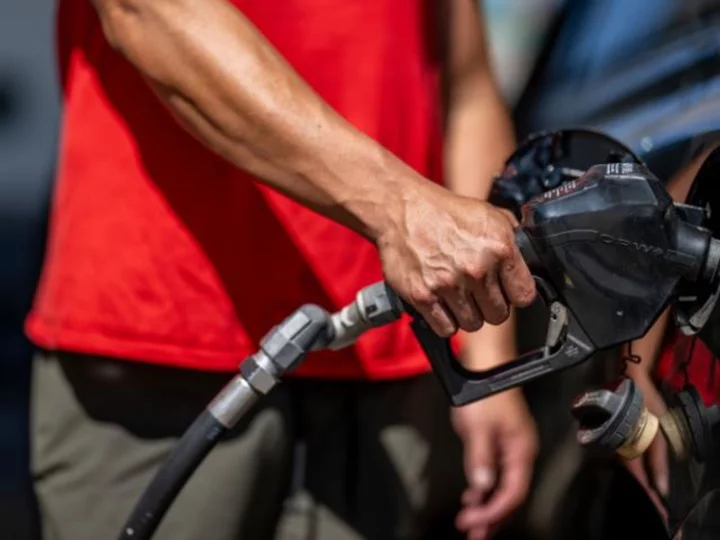This summer's historic heatwave is making life more expensive for American drivers.
Even as inflation cools across most of the economy, gasoline prices have surged to nine-month highs this week. Extreme heat is contributing to this unwelcome price spike.
The problem is that refineries, like humans, can't handle persistently sweltering temperatures.
When temperatures soar to 100 or even 110 degrees Fahrenheit, these complex facilities can't churn out all the gasoline consumers want or need. And that loss of supply is occurring just as demand is at or near a peak this summer driving season.
"Refineries break down in extreme heat. It's like running an engine at very hot temperatures for a long time," said Tom Kloza, president of the Oil Price Information Service.
As refineries have suffered outages, pump prices have soared. The national average for regular gasoline has climbed by 30 cents over just the past month alone to $3.83 a gallon, according to AAA.
Ironically, all of this shows that not even oil and gas companies — an industry that scientists blame in part for global warming — are immune from the consequences of the climate crisis. And consumers are suffering the consequences as gas prices rise, a development that threatens to undo some of the progress made on the inflation front across the economy.
Saudi Arabia and Russia restrain supply
Of course, extreme heat is not the sole factor behind the gas price jump. Oil prices continue to be the main driver of retail pump prices.
And since mid-June, US oil prices have climbed by 22%, reflecting easing recession fears and promises by Saudi Arabia and Russia to restrain supply.
Saudi Arabia on Thursday announced plans to extend a 1-million-barrel-per-day voluntary supply cut for another month and threatened to do even more this fall. Russia also announced plans to slash oil exports by 300,000 barrels per day in September.
Still, high heat is clearly piling pressure on gas prices.
In the Middle East, extreme temperatures are forcing some nations to burn oil to keep the lights on and meet demand for air conditioning.
In Texas, Louisiana and elsewhere along the Gulf Coast, some refineries have been forced to slow activity due to unscheduled maintenance.
Why high heat matters
In order to churn out gasoline, jet fuel and diesel, refineries heat crude oil, sometimes to 900 or 1,000 degrees Fahrenheit, to break the molecules down, according to Andy Lipow, president of consulting firm Lipow Oil Associates.
After heating the oil, it must be cooled to get the finished product. Normally, that is a standard process, but everything changes in triple-digit temperatures that persist.
"As it gets hotter outside, the cooling back down gets more and more difficult," said Lipow.
High heat can also snarl maintenance efforts at refineries.
From a pure profit standpoint, refineries have every incentive to go all out right now. Profit margins are high, making it lucrative to maximize the production of gasoline, jet fuel and diesel.
"Refineries are doing very, very well — if they can keep their operations going. The profit potential and the motivation is there to run as hard as you can," said Kloza.
Diesel prices surge
However, Kloza said most refiners that would like to run at 100% capacity are only able to run at 85% when it's 100 degrees outside.
This is a particular issue because refinery capacity has dropped in recent years, leaving little room for error.
"There really is no slack in the system," said Lipow.
This situation has also helped drive up jet fuel and diesel prices. Diesel is a crucial fuel for the economy, powering trucks, boats and trains. Higher transportation costs will eventually get passed along to consumers.
Retail diesel prices have surged by 31 cents a gallon over the past month, according to AAA. The futures market is signaling more gains to come for diesel.
"Everyone gets really excited about high gas prices. But those fuels have an even more insidious impact on inflation," Kloza said.
The good news is there are signs the impact of high heat on gas prices may be easing.
Even as retail prices continue to climb, wholesale prices for gasoline have flattened out.
"I think we're hitting a plateau," said Kloza.
Drivers should catch a break in the coming weeks as fuel demand typically drops in September when summer ends.
Kloza said gas prices could just be pennies away from their peak of the summer.
The one catch? If there's a major hurricane, perhaps one strengthened by the unusually warm ocean temperatures, that threatens the Gulf Coast and its hub of refineries.

